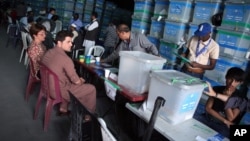Afghanistan’s top election official says postponed parliamentary polls will be held in October, promising mistakes of the bitterly disputed 2014 presidential vote would not be repeated.
Independent Election Commission Chairman Ahmad Yousuf Nuristani announced Monday in Kabul the panel has made “all technical” preparations to ensure “fully transparent” parliamentary and district council elections on October 15.
The Afghan parliament’s five-year term expired last June, but security fears and political squabbling on election reforms to ensure a fair vote prevented the IEC from holding elections to choose a new legislative assembly.
The crisis prompted President Ashraf Ghani to extend the parliament’s mandate, through decree, until a vote could be held. The move drew severe criticism, with many Afghans questioning its legality.
Nuristani said the IEC needed $67 million to cover expenses and ensure the timely holding of the elections, urging the government to make the necessary budget available and provide security for candidates, election staff and ballot boxes.
The 2014 presidential vote was marred by widespread accusations of fraud, in which both Ghani and his election rival Abdullah Abdullah claimed victory.
U.S. intervention ended months of deadlock and negotiated a deal under which the election rivals agreed to form the so-called national unity government, with Abdullah becoming the chief executive officer, a post created under the deal.
Ghani and Abdullah also agreed on electoral reforms as a condition for future elections, but both have made little if no progress.
Even those efforts have come to a halt after a set of recommendations prepared by a government-formed special reform commission were rejected by both houses of the Afghan parliament.
The political wrangling also forced international donors to cut funding for Afghanistan to undertake electoral reforms.
Addressing Cabinet members in Kabul shortly after the IEC announcement, Abdullah reiterated his demand for holding the future elections under a new election commission.
Electoral reform is an important issue, he said, but “Afghans remain concerned about the flawed management of the previous elections.”
Without the new parliament and district councils in place, the unity government will not be able to convene a constitutional grand assembly or loya jirga, which alone is authorized to amend the constitution and give legal cover to the office of the Afghan chief executive and its actions.





